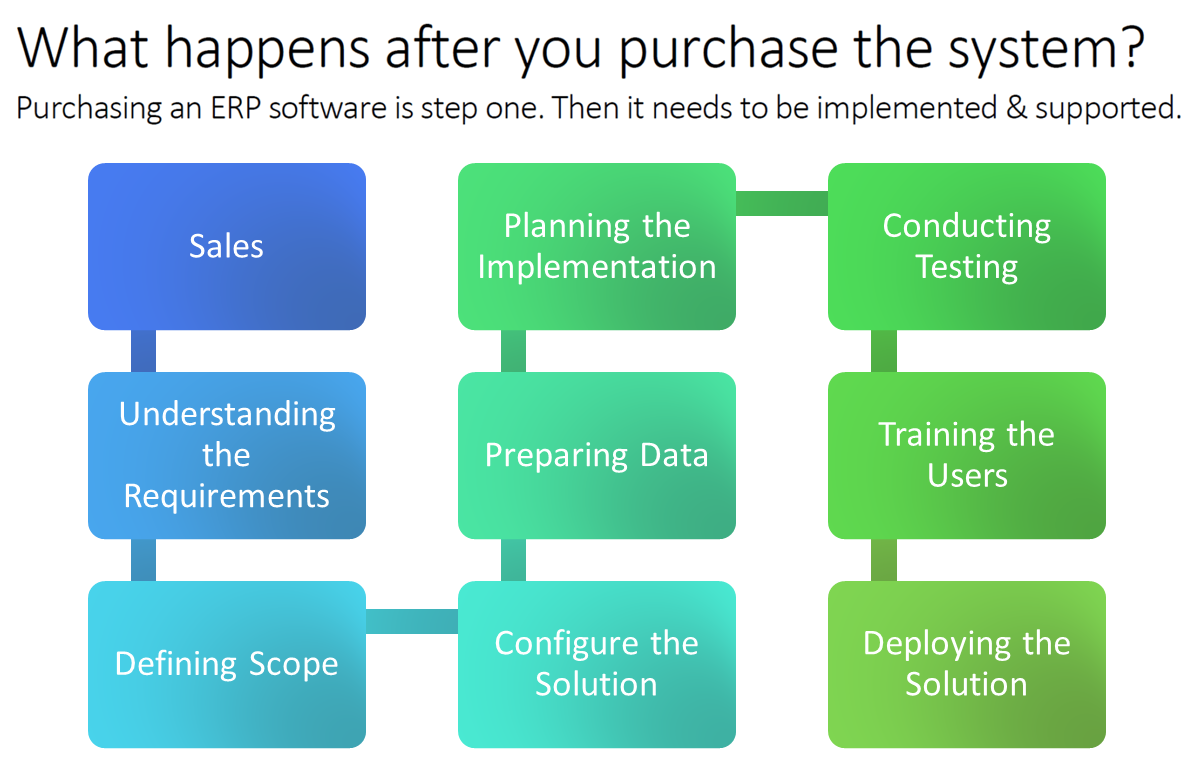OUR PROFESSIONAL SERVICES
ERP SOFTWARE IMPLEMENTATION, DEVELOPMENT & SUPPORT

THE IMPLEMENTATION METHODOLOGY
Business Computing offers a wide range of software products and services. They include but not limited to ERP systems design and integration, IT consulting, analysis, development, installation the implementation of Enterprise Resource Planning. When we talk about software implementation & services, we are usually estimating an approximate number of hours to work with a client or organization in the set-up and implementation of the software, and the training of their staff.
The implementation & training for the complete Microsoft Dynamics 365 Business Central system with or without additional components, Add-ons, Apps, etc. is initially estimated at a ratio of 1:1 (Software cost: Services cost) [hourly rate - time & material], pending a more detailed review of the scope of the project.
The review can be done before the purchasing or the leasing. Since no two companies are alike, some key factors affecting that ratio are first whether it's your team or our team that will be doing the implementation, then the complexity of the project, number of people to be trained, customization, report generation assistance, and length of time of the overall project. Speaking of that review, the first step will be to determine the needs of your organization. This will be accomplished with a diagnostic, the scope of which can range from simple to very detailed. After that, the four cornerstones of a successful solution - project planning and management, training and setup, customization, support - begin to shape the project. Trained business application experts and custom programmers design modifications suited to client needs.
During this process, we will review our methodology to ensure a successful implementation, create the project plan with the client, and assign roles, tasks, and responsibilities. This will be followed by several meetings or discussions resulting in a finished deliverable that acts as a road map for the project. In order for data to be useful to your organization's success, the information must meet the criterion that is unique to your industry, your enterprise, and your individual departments.
The implementation plan for Dynamics 365 Business Central is a critical component of the deployment process. It outlines the steps needed to ensure a smooth and successful implementation of the solution. This plan should be developed by the implementation team before beginning the deployment process.

UNDERSTANDING THE REQUIREMENTS
The first step in the implementation process is to understand the requirements of the organization. This involves identifying the current business processes, pain points, and areas that need improvement. The implementation team should work closely with the organization to gather this information.
PLANNING THE IMPLEMENTATION
With a clear understanding of the requirements and the scope defined, the implementation team should create a detailed implementation plan. This plan should include timelines, work breakdown structure, resource allocation, and milestones.
CONFIGURE THE SOLUTION
Dynamics 365 Business Central is a flexible solution that can be customized to meet the specific needs of an organization. The implementation team should configure the solution according to the requirements of the organization.
TRAINING THE USERS
Before deploying Dynamics 365 Business Central, it is essential to train the users on how to use the system. This involves providing them with training manuals, conducting training sessions, and providing ongoing support.
MONITORING AND OPTIMIZATION
After deployment, it is important to monitor the system to ensure it is working as expected. The implementation team should continually optimize the system to ensure it is meeting the organization's needs.
DEFINING THE SCOPE
Based on the requirements gathered, the implementation team should define the scope of the deployment. This involves identifying the modules and features of Dynamics 365 Business Central that are needed to meet the organization's needs.
PREPARING THE DATA
Before implementing Dynamics 365 Business Central, it is essential to prepare the data. This involves cleaning up existing data, ensuring data accuracy, and importing data into the system.
CONDUCTING TESTING
Once the solution has been configured, testing should be conducted to ensure that it works as expected. This involves testing each module and feature of the system and verifying that it meets the organization's requirements.
DEPLOYING THE SOLUTION
Once testing is complete, and users have been trained, it is time to deploy Dynamics 365 Business Central. This involves migrating data, and making the system operational.
CONCLUSION
Implementing Dynamics 365 Business Central is a critical process that requires careful planning, execution, and monitoring. By following the implementation plan outlined above, organizations can ensure a smooth and successful deployment of the system.
